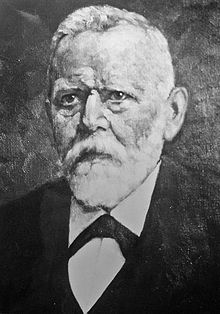Wilhelm Schlueter (politician, 1844)
Wilhelm Schlueter (* 1844 in Hörde near Dortmund ; † March 27, 1930 in Gütersloh ) was a German doctor and local politician. In 1918 he was made an honorary citizen of Gütersloh .
resume
Wilhelm Schlueter was the son of a pharmacist who came from Gütersloh and had moved to Dortmund for work. When the mother died in 1849, the father moved back to Gütersloh.
At the age of 34 Schlüter married Clara König, the daughter of a local pharmacist, in 1878. The couple had twelve children.
Medical career
After graduating from the Evangelisch Stiftisches Gymnasium , Schlüter studied medicine in Halle and Berlin, where he received his doctorate in 1867 . He completed his military service a. a. as a doctor with the Guard Fusilier Regiment in Berlin. In the Franco-Prussian War of 1870/71 he took part as an assistant doctor. This was followed by promotion to the Landwehr medical officer .
After the war he established himself as a general practitioner in Gütersloh. From 1884 he was a member of the medical commission for health police tasks. In 1891 he became medical officer for the district of Wiedenbrück (so-called district physician). In 1895 he was appointed to the Royal Medical Council, in 1901 to the Medical Council, and in 1905 to the Secret Medical Council . In 1899 he received the Red Cross Medal III. Class, 1904 the Order of the Red Eagle IV class. In 1907 he founded a welfare office for tuberculosis patients in Gütersloh . In 1908 he took over the management of the Evangelical Hospital . In 1918 he retired after 50 years of work. He worked voluntarily as chairman of the Warrior Medical Column of the Red Cross, as a board member of the Medical Association for Westphalia , as chairman of the medical association of the district of Wiedenbrück and as treasurer of the anniversary foundation of the Prussian Medical Officials Association.
Commitment to local issues
Schlüter was a member of the Gütersloh city council from 1878 to 1919 and a member of the district council from 1888 to 1910. In addition to the above-mentioned offices in the school committee, the auxiliary school commission and the board of trustees of the secondary girls' school, he was also involved in the waterworks commission (the Gütersloh water tower was built in 1888 ) and in the supervisory board of the Gütersloher Bank (today Volksbank Bielefeld-Gütersloh ).
On April 1, 1918, he was named an honorary citizen of Gütersloh as the fourth citizen and after Friedrich Wilhelm Stohlmann and Carl Zumwinkel as the third physician for his work “for the welfare and prosperity of his hometown”. A street in the city is named after him.
source
- Stephan Grimm, Heinrich Lakämper-Lührs: Gütersloher write history, Wartberg Verlag, Gudensberg-Gleichen, 2005, ISBN 3831315884
| personal data | |
|---|---|
| SURNAME | Schlueter, Wilhelm |
| BRIEF DESCRIPTION | German doctor, secret medical adviser, honorary citizen of Gütersloh |
| DATE OF BIRTH | 1844 |
| PLACE OF BIRTH | Hear |
| DATE OF DEATH | March 27, 1930 |
| Place of death | Gutersloh |
